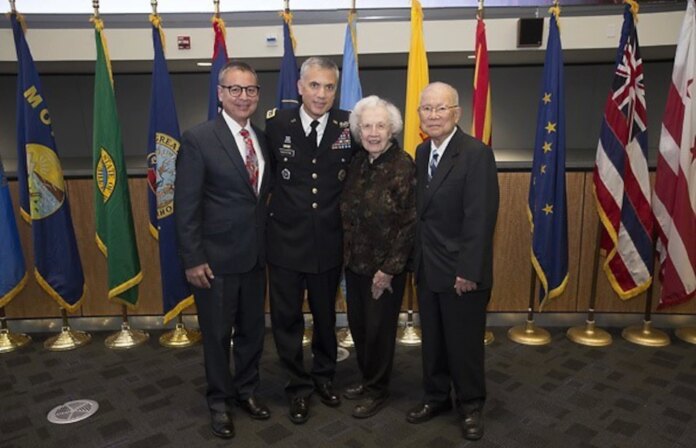FORT MEADE, Md. — During the month of May, the National Security Agency (NSA) is honoring Asian American Pacific Islander (AAPI) Heritage Month. This year’s Department of Defense theme for the month, “Advancing Leaders Through Collaboration,” is a message that rings true to the AAPI community and our nation. The following is a reflection during AAPI Heritage Month by GEN Paul M. Nakasone, Commander, U.S. Cyber Command, Director, NSA/Chief, CSS, and member of the AAPI community, on his heritage, his work on behalf of the nation, and how diversity benefits us all.
As you reflect on your heritage, how has it shaped the person you are today, personally and/or professionally?
My father is a second generation Japanese American of Okinawan descent who grew up in Hawaii and passed down to me rich cultural traditions. Going to Hawaii to visit with relatives, I came to appreciate what it means to pound mochi on New Year’s Day, where the best saimin houses are in downtown Honolulu, and what a Bon Dance is in the summer.
My father was 14 years old when he witnessed the attack on Pearl Harbor in December 1941. He later went on to join the Army as a Japanese interpreter with the Military Intelligence Service to help with the American reconstruction efforts in Japan. After separating from the Army, he completed his undergraduate degree at the University of Hawaii, but did not use his GI Bill — he decided to use that for graduate school. When he was in the Army, he attended Japanese language training in Minnesota; it was where the Army trained their Japanese linguists given the racial hysteria on the West Coast — he never forgot that. So he decided to pursue his graduate studies there, and eventually met my mother, who was from Minnesota. That’s where I was born and raised.
What brought you to NSA and what inspires your work?
In 2002, I was chosen to command a battalion at Fort Gordon, Georgia. The battalion provided Soldiers to the Gordon Regional Security Operations Center, now NSA-Georgia (NSAG). It was my first exposure to NSA and it occurred during the Agency’s development of support to military operations that NSAG has led for nearly two decades.
I arrived at Fort Meade, Maryland, in 2007 at a time when General Keith Alexander, then Director of NSA, recognized the need for improvement in how we support the warfighter in Iraq and Afghanistan. I understood what was needed in the field from my own experience leading a battalion in Fort Gordon, deploying to Iraq and Afghanistan, and taking command of the Meade Operations Center. I was both a consumer and producer of intelligence and I knew we needed to do more. My combat experience and perspective positioned me to lead the Command and Agency and to envision the future of cyber operations.
My father greatly influenced my career. When I was in high school I wrote a paper on the U.S. Army’s 442nd Regimented Combat Team, which was composed almost entirely of second-generation American Soldiers of Japanese ancestry who fought in World War II. This was the first time I ever thought deeply about this topic relative to my background. I had cousins who served in the 442nd and now, having spent my career in the Army, I feel a sense of pride being associated with that tradition of service.
Additionally, both my parents were educators. They had a strong work ethic and belief in teamwork and persistence. They instilled in me the value of service to friends, community, neighbors, and the Nation. I consider myself privileged to be able to serve the Nation every day.
What advice do you have for individuals starting their careers?
Be open-minded — I was an economics major. I never thought I would be the Commander of U.S. Cyber Command and Director of NSA. Don’t limit yourself to a certain path that you will not find meaningful.
Take risks — allow yourself to explore different career paths and be unafraid.
Follow your passion — I’m fortunate to love what I do. I always tell people you need to find something you like to do and something that is fulfilling. If you start to lose that sense of fulfillment after a while, it might be time to find another path.
I also tell people to read. Reading broadens your world and your mind. To be successful you need to speak and write effectively and reading helps with that. Reading can help you learn how others solve tough problems, both personally and professionally.
Lastly — get a mentor. Find someone you trust and ask them for guidance about how you can best live up to your potential. We are not always the best judges of our abilities or what we are capable of doing. The objective perspective of someone who knows us well can often help us make the best decisions.
If you could give someone the ability to see through your lens for a day, what would they see?
They would see a very busy calendar. I’m frequently amazed at how busy a calendar can be and I’m sure it would surprise others. One would also be intrigued at how hard those in my front office work — it’s non-stop from dawn to dark.
What you will also see is a very intentional effort to spend my time wisely. Yes, I take time to exercise, run, and find solitude. That’s essential for my health and well-being. I do everything I can to put my family and people first. I focus on the highest priorities — the things only I can do. Anything I can delegate, I will pass to others who are just as capable.
My lens is one of both being available to those who need me and putting my expertise to where I can best be of service.
What are your thoughts on diversity, equity, and inclusion challenges, and what are your hopes for the future?
The efforts of NSA’s ERGs and similar community groups outside of the Agency are exactly the kind of force that will harness and drive change. While Government agencies like ours can and do support a wide range of diversity initiatives, it’s really the smaller groups and voices that set the foundation for change and progress.
I think part of the answer is to appreciate each other’s differences. I believe in discourse — talking through issues and hearing other perspectives. That requires another really valuable skill — listening. We all swear the same oath to the Constitution, but to know each other, we need to listen and understand where they’re coming from. The strength of the Command and Agency comes from our people. Without the dedication of our people we wouldn’t be able to accomplish our mission. And we can’t be successful in our mission without a diverse workforce. We are not served well when everyone thinks the same. We need team members who bring multiple perspectives, views, ideas, and backgrounds to solve our toughest problems and to pave the way for a stronger, safer future.
[ad_2]



